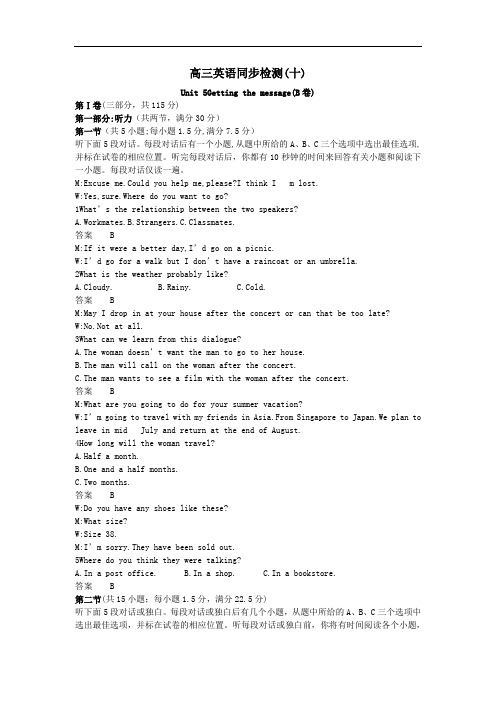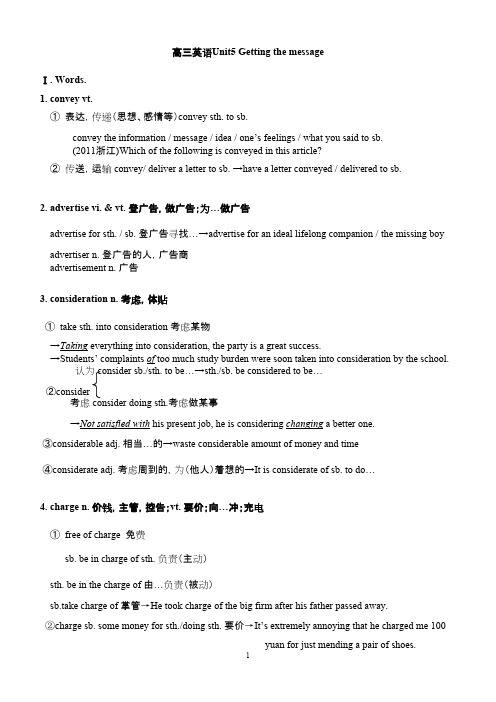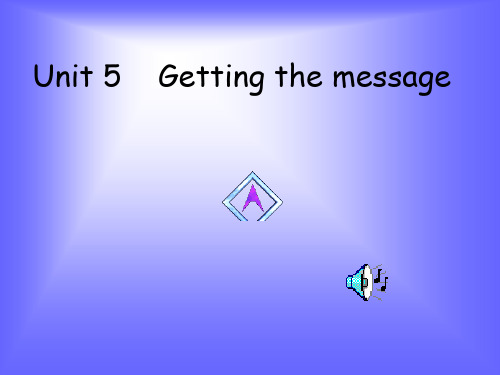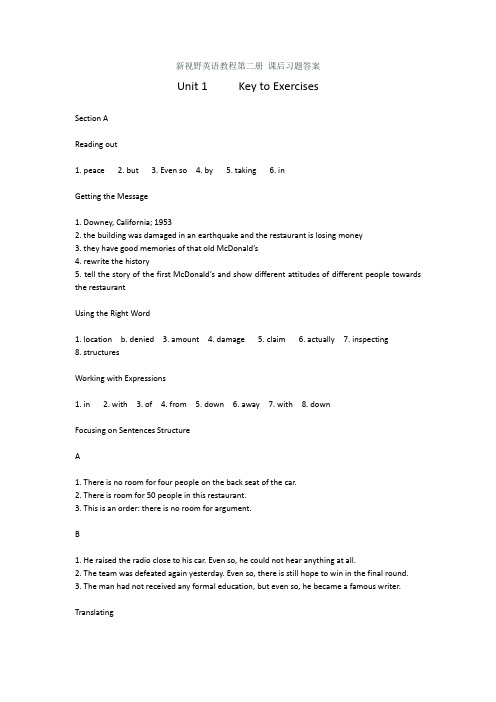Unit 5 Getting the message
-度高三英语同步测控优化训练unit5 b卷

高三英语同步检测(十)Unit 5Getting the message(B卷)第Ⅰ卷(三部分,共115分)第一部分:听力(共两节,满分30分)第一节(共5小题;每小题1.5分,满分7.5分)听下面5段对话。
每段对话后有一个小题,从题中所给的A、B、C三个选项中选出最佳选项,并标在试卷的相应位置。
听完每段对话后,你都有10秒钟的时间来回答有关小题和阅读下一小题。
每段对话仅读一遍。
M:Excuse me.Could you help me,please?I think I m lost.W:Yes,sure.Where do you want to go?1What’s the relationship between the two speakers?A.Workmates.B.Strangers.C.Classmates.答案 BM:If it were a better day,I’d go on a picnic.W:I’d go for a walk but I don’t have a raincoat or an umbrella.2What is the weather probably like?A.Cloudy.B.Rainy.C.Cold.答案 BM:May I drop in at your house after the concert or can that be too late?W:No.Not at all.3What can we learn from this dialogue?A.The woman doesn’t want the man to go to her house.B.The man will call on the woman after the concert.C.The man wants to see a film with the woman after the concert.答案 BM:What are you going to do for your summer vacation?W:I’m going to travel with my friends in Asia.From Singapore to Japan.We plan to leave in mid July and return at the end of August.4How long will the woman travel?A.Half a month.B.One and a half months.C.Two months.答案 BW:Do you have any shoes like these?M:What size?W:Size 38.M:I’m sorry.They have been sold out.5Where do you think they were talking?A.In a post office.B.In a shop.C.In a bookstore.答案 B第二节(共15小题;每小题1.5分,满分22.5分)听下面5段对话或独白。
高三英语unit5语言点解析

高三英语Unit5 Getting the messageⅠ. Words.1. convey vt.①表达,传递(思想、感情等)convey sth. to sb.convey the information / message / idea / one’s feelings / what you said to sb.(2011浙江)Which of the following is conveyed in this article?②传送,运输 convey/ deliver a letter to sb. →have a letter conveyed / delivered to sb.2. advertise vi. & vt. 登广告,做广告;为…做广告advertise for sth. / sb. 登广告寻找…→advertise for an ideal lifelong companion / the missing boy advertiser n. 登广告的人,广告商advertisement n. 广告3. consideration n. 考虑,体贴①take sth. into consideration 考虑某物→Taking everything into consideration, the party is a great success.→Students’ complaints of too much study burden were soon taken into consideration by the school.be…→sth./sb. be considered to be…考虑做某事→Not satisfied with his present job, he is considering changing a better one.③considerable adj. 相当…的→waste considerable amount of money and time④considerate adj. 考虑周到的,为(他人)着想的→It is considerate of sb. to do…4. charge n. 价钱,主管,控告;vt. 要价;向…冲;充电①free of charge免费sb. be in charge of sth. 负责(主动)sth. be in the charge of 由…负责(被动)sb.take charge of 掌管→He took charge of the big firm after his father passed away.②charge sb. some money for sth./doing sth. 要价→It’s extremely annoying that he charged me 100yuan for just mending a pair of shoes.③charge downstairs/out of the classroom/for…冲向楼下/冲出教室/冲往…④get charged充电5. loss n. 遗失,损失be angry about the ads for weight loss products 对广告登的减肥产品不满suffer heavy loss 伤亡/损失惨重be a loss to sb. 对某人是一种损失be at a loss 不知所措,困惑be filled with a sense of loss 充满了失落感6. blame vt. 责备,归咎于;n. 责任① blame sb. for sth.因…而责备某人→blame him for his failure/the breakdown of the networkblame sth. on sb.把…怪到某人头上→blame his failure/the breakdown of the network on him② sb. be to blame for sth某人因…而受责备(无被动)→My brother, together with his classmates④ take/get/accept/bear the blame for sth. 承担对某事的责任7. mislead vt. 使误解, 使误入歧途misled―misledmislead sb. into doing误导某人做某事misleading adj. 误导的→misleading information/ads.8. broadcast vt. 播出/传播 broadcast---broadcastbroadcast the football match live = a live broadcast of the football match现场直播足球赛9. hand in hand 手拉手;密切关联的→The couple are often seen walking hand in hand in the evening.①lend/give sb. a hand with sth. 帮忙做…②on the one hand….on the other (hand) 一方面…另一方面…10. react vi. 反应,放抗;vt.起化学反应react to sth. / one’s reaction to sth. 对…作出反应 chain reaction连锁反应→Children tend to react to their parents by going against their wishes.11. annoy vt. 使烦恼;使恼怒① sth. annoys sb.→sb. be annoyed at/about sht.annoyed 恼怒的,生气的annoying 使人恼怒的②what annoys sb. (most) is that… 使某人(最)生气的就是…→What annoys me now is that they haven’t turned up at the appointed time.12. critic n. 批评者;评论家① critical adj. 批评的,批判性的,挑剔的 / 极重要的,关键的,至关紧要的②take a critical attitude towards sth. 对…持批判态度→Your promotion is critical to our future. 你的提升对我们的将来至关重要。
新视野英语教程_I_(读写教程)课后练习答案

新视野英语教程(读写教程1)课后练习答案UNIT ONESECTION AFill in the blanks:1. be2. whatever3. on4. though5. set6. untilGetting the message1. A2. B3. C4. D5. AUsing the Right Word1. A2. C3. B4. A5. C6. A7. D8. AWorking with Expressions1. of2. at3. down4. up5. by6. on7. up8. ToFocusing on Sentence structureA.1. You can take whatever you like from the gifts.2. The students are free to ask whatever (questions) they want to.3. Just read something to kill time, a book, magazine, newspaper, or whatever.B.1. I will leave at 9, unless you want to go earlier.2. Unless he lets me use his bike, I won’t let him use my computer.3. Unless something goes wrong, I’ll see you next week.TranslatingA.1. Did you have a great time (have a wonderful time, enjoy yourself, have a greattime) at the party last night2. This term she has taken courses in English, computers / computing, anddriving.3. He has a debt to his girlfriend who has helped him a lot.4. I have learnt one thing: never let your friends down.B.1. 的确,会有很多人帮助你,但是无论你决定做什么,你常常得自己走出第一步。
Getting the message

C appeal to their emotions
D reduce the price of the products.
Main idea
P1: advertising is a highly developed industry. P2: people react to ads in different ways. P3: the basic principle of advertising P4-6: ads are helpful in many ways./the advantages of ads P7: ads are not helpful/ the disadvantages of ads P8: WWWeheassthhkoiunllddddotfisatakitnetgiutaiusdhcerfiasthlisoceualalddaswtfetriottmaukdtereuteotwoaadwrsadrs]
to tell people publicly about a product or service in order to persuade them to buy it.
advertising:[n]
[U] the activity or business of advertising things on TV, in newspapers etc
B gone hand in hand
C gone behind
D taken place
3. The best chance to reach customers is to_____.
A sell them the product
B sell them what money can not buy: love, happiness and success.
新视野英语教程_II_(读写教程)课后练习答案 - A

新视野英语教程第二册课后习题答案Unit 1 Key to ExercisesSection AReading out1. peace2. but3. Even so4. by5. taking6. inGetting the Message1. Downey, California; 19532. the building was damaged in an earthquake and the restaurant is losing money3. they have good memories of that old McDonald’s4. rewrite the history5. tell the story of the first McDonald’s and show different attitudes of different people towards the restaurantUsing the Right Word1. location b. denied 3. amount 4. damage 5. claim 6. actually 7. inspecting8. structuresWorking with Expressions1. in2. with3. of4. from5. down6. away7. with8. downFocusing on Sentences StructureA1. There is no room for four people on the back seat of the car.2. There is room for 50 people in this restaurant.3. This is an order: there is no room for argument.B1. He raised the radio close to his car. Even so, he could not hear anything at all.2. The team was defeated again yesterday. Even so, there is still hope to win in the final round.3. The man had not received any formal education, but even so, he became a famous writer.Translating1. The house was on fire and the people inside were in danger of losing their lives.2. He cannot afford to buy such a fine house.3. Although this idea may sound strange, it does make sense.4. John seems (to be )a nice person. Even so, I don’t trust him.B1. 虽说第一家麦当劳餐馆只售汉堡包和薯条,它还是成了一种文化象征.2. 这些人想到餐馆连同他们美好的回忆一起被摧毁,感到非常愤怒.3. 他们在利用那次地震作借口.4. 有人认为麦当劳想关闭这家餐馆的真正原因与金钱无关.Basic Writing Skills1. are2. go3. is4. is5. needs6. was7. were8. areSection B1. B2. C3. C4. D5. BUsing the Right Word1. purchasing2. critical3. defeat4. opposed5. values6. provide7. treated8. uniformWorking with Expressions1. at2. out3. to4. out5. against6. on7. to8. inSection CA1). Mr. and Mrs. Zhang Hua’s2). dinner 3). Friday 4). 18th5). January 6). 7:00 7). pm 8). Suite 402, No. 120 Jianguo Road (W)B1) We take pleasure in inviting you to2) from 12 to 15 October, 20053) newly designed samples4) will be on exhibition5) please inform us of your date of arrivalC1) the honor of your presence2) a reception in White Cloud guest House3) the 9th September, 2005,4) 7:00 to 8:00 pmUnit 2 Key to ExercisesSection AReading out1. lasts2. important3. survives4. culture5. trend6. certainGetting the Message1. C2. C3. B4. A5. DUsing the Right Word1. furniture2. appear3. advertisement4. desire5. foolish6. creates7. economy8. additionalWorking with Expressions1. in2. to3. about4. towards5. at6. in7. for8. toFocusing on Sentence StructureA.1. Children like it because it is more than just a simple toy.2. More than just your life will be affected ; it is the whole group.3. She can more than just sing well; she is also a good dancer.B1. It appears that you’ll be the only boy at the party.2. He appears to be friendly, but you still have to be careful.3. She appeared quite excited to hear that John was coming soon.TranslatingA1. If he starts talking about the past, you’ll never get away from him.2. There is a tendency for job losses to rise in the winter.3. Because of my frequent demands, father finally agreed to go to Australia with me.4. He sold his shop and opened a new one to make more money.B1.迅速变化的不仅仅只是一年流行而第二年就过时的服饰和发型,而是整个生活方式.2.比如,1981年,一位名不见经传的老夫人出现在一个电视广告中,她看着一只很小的汉堡包,大声抱怨说:“牛肉呢?”3.尽管时装设计师影响时装潮流为的是赚钱,但是这种赚钱的欲望并不能解释其他方面的时尚,例如语言。
《新视野英语教程(第三版)》教学资源book4Unit5-Section-A

Are Books an Endangered Species?
CONTENTS
Preparation Reading Through Exercises
Merry Learning
Preparation
elementary
mere
chancellor
presence
plentiful
participant
marketplace
outlet
slide
reverence
fiction
inspection
instance
primitive
>>>more
Phrases and Expressions come of age hand down close by carry around so far sit through time and again on the go
>>Key
Getting the Message
1. There were hundreds of books in that room. 2. The book is a symbol of the permanence of thought and the handing
down from one generation to the next. 3. Of those same college freshman, many had ranked in the top half of
their high school classes. 4. Commercial book sales are sliding quickly. 5. Because a cultural consumer prefers those passive activities-listening
[推荐精选]Getting the message上课学习上课学习教案_2
Getting the message教案Gettingthemessage教案ReferenceforTeachingⅠ.onAdvertisingAdvertisingbeganinthesignsthatmerchantsonceputovert heirdoorstotellthepublic,withsymbolsorpictures,exac tlywhatwasforsaleinside.Posters,pamphletsandhandbil lsbeganappearinginEnglandaftertheinvention,inabout1 450ofmovabletypesinGermany.ThefirstnewspapersappearedinEnglandinthe17thcentury andintheNewworldatthebeginningofthe18th.Advertising soonbecamepartofthesenewspapersasitbecamepartofthem agazinesthatfollowedintheearly19thcentury.AdvertisingagenciesbegantoemergeintheUnitedStatesin the1840s.Theywereactuallyspacebrokers,sellingspacei nnewspapersandmagazines.Infact,thegenerallyaccepted definitionofadvertisingwas“keepingyournamebeforethepublic”.modernadvertisingbeganinthechicagoagencyLord&Th omsin1904.ItwastherethatAlbertLasker,knownas “thefatherofmodernadvertising”,andacopywritername djohnE.kennedycoinedthedefinition“Salesmanship”inprint.Forthefirsttimetheideaofpersuasionandthecom parisiontotheroleofapersonalsalespersonwasbroughtto advertising.Thisledtofurtherconceptssuchastheconsum erbenefit,puttingforthnotsimplyafeatureoftheproduct butthebenefititwouldbringtotheprospectwhenused.This redefinitionofadvertising,alongwiththeintroductiono fradiointheUnitedStatesinthe1920s,gavetheindustryaw avethatcarrieditthroughtheGreatDepressionandtheUnit edStatesbeganbroadcastinginmajorcities.Thiswasthest artofthebigadvertisingdevelopmentinwhichadvertising expendituresincreasedtenfoldbetween1950and1980.Ⅱ..advertisingadvertising是广告的总称,指广告设计或广告行为,无复数形式。
新视野英语教程2答案
Unit 1 (Section A)Reading Out(1) peace (2) but (3) Even so (4) by (5) taking (6) inGetting the Message(1) Downey, California; 1953 (2) the building was damaged in an earthquake and the restaurant is losing money (3) they have good memories of that old McDonald's (4) rewrite the history (5) tell the story of the first McDonald's and to show people's different attitudesUsing the Right Word⑴location (2) denied (3) amount (4) damage (5) claim (6) actually (7) inspecting (8) structures Working with Expressions(1)in (2) with (3) of (4) from (5) down (6) away (7) with (8) downFocusing on Sentence Structure①There is no room for four people on the back seat of the car. ②There is room for 50 people in this restaurant. ③This is an order: there is no room for argument. ④He raised the radio close to his ear. Even so, he could not hear anything at all.⑤The team was defeated again yesterday. Even so, there is still hope to win in the final round.⑥The man had not received any formal education, but even so, he became a famous writer.Translating①The house was on fire and people inside were in danger of losing their lives.②He cannot afford to buy such a nice house.③Although this idea may sound strange,it does make sense.④John seems (to be)a nice so,I do not trust him.⑤虽说第一家麦当劳餐馆只售汉堡包和薯条,他还是成为了一种文化象征。
2011年高考英语 Unit 5 Getting the message总复习大纲版知识点精讲精析与
第三册Unit 5 Getting the messageI.单元知识点全览工欲善其事必先利其器高考须掌握的词汇:1.advertisement;advertiser 2.consider 3.reaction4.annoyed/annoying 5.association 6.frequently7.1egal 8.lose 高考须掌握的短语:1.take 2.charge 3.to 4.across 5.keep 6.sense 7.of 8.to 9.out 10.in 11.withⅡ.考点过关过关斩将一马平川考点详解精剖细解入巿三分一、重点词汇1.consideration n.考虑;着想;体贴 eg:Before writing your answers,please give careful conslderation to the questions.清在答题之前仔细考虑一下问题。
What should you take into COllSldoration bcfore buymg|I car?买车之前你应考虑什么问题? He showed no conslderation for his wife 他不体贴他的妻子。
相关链接:consldcr vt.考虑 considcrate adj.体贴人的 considering prep.就……而言;考虑到……用法拓展:have consldoration for others为别人着想takc…Into consideratlon考虑某事物.将……纳入考虑范围之内 bc under coilslderation在考虑中under no conslderatlon轻率:不似思索特别提醒:consldcr当“考虑〞后接动名词作宾语。
案例剖析旁征博引举一反三考题 1 (典型例题分) every thing into consideration, she decided to workin Tibet.A. GivingB. TakingC. TakenD. Given考题1点拨:答案为H。
【学习实践】Getting the message教案_2
Getting the message教案Gettingthemessage教案ReferenceforTeachingⅠ.onAdvertisingAdvertisingbeganinthesignsthatmerchantsonceputovert heirdoorstotellthepublic,withsymbolsorpictures,exac tlywhatwasforsaleinside.Posters,pamphletsandhandbil lsbeganappearinginEnglandaftertheinvention,inabout1 450ofmovabletypesinGermany.ThefirstnewspapersappearedinEnglandinthe17thcentury andintheNewworldatthebeginningofthe18th.Advertising soonbecamepartofthesenewspapersasitbecamepartofthem agazinesthatfollowedintheearly19thcentury.AdvertisingagenciesbegantoemergeintheUnitedStatesin the1840s.Theywereactuallyspacebrokers,sellingspacei nnewspapersandmagazines.Infact,thegenerallyaccepted definitionofadvertisingwas“keepingyournamebeforethepublic”.modernadvertisingbeganinthechicagoagencyLord&Th omsin1904.ItwastherethatAlbertLasker,knownas “thefatherofmodernadvertising”,andacopywritername djohnE.kennedycoinedthedefinition“Salesmanship”inprint.Forthefirsttimetheideaofpersuasionandthecom parisiontotheroleofapersonalsalespersonwasbroughtto advertising.Thisledtofurtherconceptssuchastheconsum erbenefit,puttingforthnotsimplyafeatureoftheproduct butthebenefititwouldbringtotheprospectwhenused.This redefinitionofadvertising,alongwiththeintroductiono fradiointheUnitedStatesinthe1920s,gavetheindustryaw avethatcarrieditthroughtheGreatDepressionandtheUnit edStatesbeganbroadcastinginmajorcities.Thiswasthest artofthebigadvertisingdevelopmentinwhichadvertising expendituresincreasedtenfoldbetween1950and1980.Ⅱ..advertisingadvertising是广告的总称,指广告设计或广告行为,无复数形式。
- 1、下载文档前请自行甄别文档内容的完整性,平台不提供额外的编辑、内容补充、找答案等附加服务。
- 2、"仅部分预览"的文档,不可在线预览部分如存在完整性等问题,可反馈申请退款(可完整预览的文档不适用该条件!)。
- 3、如文档侵犯您的权益,请联系客服反馈,我们会尽快为您处理(人工客服工作时间:9:00-18:30)。
Unit 5 Getting the messageREADINGADVERTISINGAds are found almost everywhere—they are broadcast on TV and over the radio, posted on the Internet and printed in newspapers and on posters in our cities. Advertising is a highly developed industry. The development of radio, television and other media has gone hand in hand with the development of advertising.People react to advertisements in different of advertising. People find ads useful and entertaining; others think that they are annoying. Defenders of ads say that ads help us make informed choices as consumers by introducing good quality products. On the other land, critics sometimes accuse companies of using ads to mislead us by making us believe that a certain product is better than it really is or that we will be happier if we buy it.The basic principle of advertising is fairly simple. By introducing a brand name to potential customers, and by associating the product with the customers’ needs, companies are able to influence the choices customers make. Customers see so many ads every day that advertisers must work hard to get their best chance to reach customers is to appeal to their emotions. Thus, instead of selling them the product, the ads sometimes seem to be selling them what money cannot buy: love, happiness and success.Ads help companies and customers in a variety of ways. It has been proven again and again that frequent advertising increases product sales. Since an increase in sales means an increase in production, makes it cheaper. Advertisements also help consumers choose among all the available products. There are many things we need to take into consideration before we buy an expensive product, such as a car or a computer, and ads can help us make the right decision.Perhaps the most important function of advertising is to introduce new products. Truthful ads provide good information that helps customers to decide whether they want or need the advertised product. By explaining the features, function of costs of a product or service, ads also allow customers to compare prices and quality before they actually go to the store. Armed with facts and figures, customers are better able to deal with the often powerful arguments given by a salesman or saleswoman.Not all ads are used to promote a produ ct or to increase a company’s profits. Many governments use ad campaigns to make people aware of social problems and government policies. Aid organizations often name a well-known person as their spokesman or spokeswoman in order to get their message across. For example, the United Nations selected the soccer star Ronaldo, pop singer Tetsuya Komuro the techniques developed by the advertising industry, governments and other non-profit organizations can spread knowledge, change attitudes and improve society.There are some ads that are not helpful. These “bad ads” use illegal ways to mislead consumers. It is not always easy to spot a bad ad, but there are a few things we can look out for. First of all, we should always keep an eye out for “hidden information”. Some ads hide important by using small print or colours. Other ads mislead us by showing picures that are only partly true or have been changed to look better. A similar trick is used in so-called “bait-and-switch” ads, that is the customer is shown one p roduct (the bait) and then given another.There is no clear evidence to show just how well ads work, but they are important to both companies and consumers. Good advertisements make it possible for companies to introduce new products and increase sales. If the ads provide accurate information, they also help the average consumer to find the right product at the best price. Because ads are powerful and some companies try to mislead us, we must be careful when we read ads. If we cannot distinguish between fiction and facts, we will become easy targets for ad makes. If, on the other hand, we learn to analyse ads, we may be able to protect ourselves from false advertisements and make good choices.INTEGRA TING SKILLSReadingWORDS THAT SELLTalk is cheap, but in the world of advertising, the right word at the right time can make millions. The language used in ads differs from ordinary language. Ad-makers choose words and brand names very carefully in order to create a positive image of the product they are promoting. A good ad often uses words to which people attach positive meanings.Choosing the name for a product is of course extremely important. Company or product names can have different functions: they can tell the consumer about the advantages of the product or company. A battery might be given a name that includes the words long or last to tell customers that it lasts for a long time. If a company chooses a funny or unusual name, customers will remember the name better. Some companies prefer a well-known word, while others choose names from old stories or legends. There are also companies that invent new words for their brand or product names.A product will also sell better if it is promoted with a slogan. One of the most famous and successful slogans is “Just Do It!” and there are many others. For example, “the choice of the new generation”, or “Coke Is It”.A good slogan should be “catchy”, or easy to remember, and should convey a message or idea that will make consumers form a positive image of the company and product.People read advertisements partly for information and partly because they are interesting. Today’s advertisements often start with a question, or a puzzle, with the purpose of attracting the readers’ attention. Of course, most advertisements contain information, but it is usually presented in an interesting and funny way. Humour is very important. Sometimes advertisements tell a story, or the story may be continued over a series of advertisements. However, there is a danger in this. It is possible that the reader or viewer will remember the advertisement but not the name of the product.There are other dangers. If you are selling your product in a foreign market, you must check that the translation is correct. A company that sold hair cream w anted to say “X puts life into dry hair.” They took some photographs of a beautiful actress, and the advertisements appeared on large boards by the side of the road. Nobody bought the product, however, because when translated it meant “X puts living things into dry hair.”In the 1960s, a British car company which made very expensive cars was about to sell its latest car in Germany. However, the company had to change the name of the car at the last moment. A German speaker at the factory pointed out to the s ales manager that the British name of the car meant “animal waste” in German.Some of the most powerful words that sell are those that refer to the cost. Stores promise us discounts and tell us that they have the “biggest bargains” and “the lowest prices”. Sometimes, the promises do not make sense. We should think twice when we are offered a “free gift” or an “added bonus”. And, of course, the best-seller is that simple, magical word that seems to pull us into a store even if we really do not need to buy an ything: “ASLE!”。
